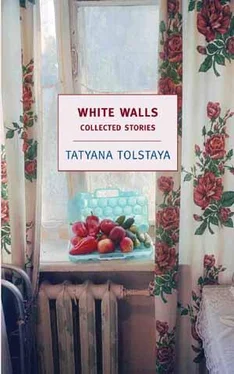Tatyana Tolstaya
WHITE WALLS
Collected Stories
Translated by
Antonina W. Bouis
Jamey Gambrell
“The other kids get to go out by themselves, but we have to go with Maryvanna!”
“When you get to be seven, you’ll get to go out alone. And you don’t say ‘disgusting’ about an elderly person. You should be grateful to Maria Ivanovna for spending time with you.”
“She doesn’t watch us on purpose! And we’re going to get run over, I know we are! And in the park she talks to all the old women and complains about us. And she says: ‘spirit of contradiction.’”
“But you really do your best to spite her, don’t you?”
“And I’ll go on doing it! I’m going to tell all those stupid old women ‘how don’t you do’ and ‘ bad-bye.’”
“Shame on you! You must have respect for your elders! Don’t be rude, listen to what they say: they’re older and know more than you.”
“I do listen! All Maryvanna talks about is her uncle.”
“And what does she say about him?”
“That he hanged himself because he had a bad bladder. And that before that he was run over by the wheel of fortune. Because he was in debt and had crossed the street improperly.”
…Small, heavyset, and short of breath, Maryvanna hates us and we hate her. We hate the hat with a veil, the holey glove, the dried pieces of “sand cookies” she feeds to the pigeons, and we stamp our feet at those pigeons to scare them off. Maryvanna takes us out every day for four hours, reads books to us, and tries to converse in French—basically, that’s what she is hired for. Because our own dear beloved Nanny Grusha, who lives with us, doesn’t know any foreign languages, and doesn’t go outside anymore, and has trouble getting around. Pushkin loved her very much, too, and wrote about her and called her “my ancient dove.” And he didn’t write anything about Maryvanna. And if he had, he’d have written “my fat piggy.”
But what’s amazing—absolutely impossible to imagine—is that Maryvanna was the beloved nanny of a now grownup girl. And Maryvanna brings up that girl, Katya, every day. She didn’t stick out her tongue, didn’t pick her nose, ate everything on her plate, and hugged and kissed Maryvanna—she was crazy.
At night, in bed, my sister and I make up conversations between Maryvanna and the obedient Katya.
“Finish up the worms, dear Katya.”
“With pleasure, sweet Maryvanna.”
“Eat a marinated frog, child.”
“I already have. Please give me some more mashed mice.”
In the park that Maryvanna called “the boulevard,” pale Leningrad girls dig in the darkened autumn sand, listening to adults talk. Maryvanna, quickly making the acquaintance of some old lady in a hat, takes out her stiff old photographs: herself and Uncle leaning against a grand piano and behind them a waterfall. Could that white airy creature in lace gloves be buried somewhere in the bowels of that gasping fat? “He was father and mother to me and wanted me to call him simply Georges. He educated me, he brought me out into society. Those pearls—you can’t see them well here—were a gift from him. He loved me madly, madly. See how handsome he is here? And here we’re in Piatigorsk. That’s my friend Yulya. And here we’re having tea in the garden.”
“Marvelous pictures. Is that Yulya too?”
“No, that’s Zinaida. Georges’ girlfriend. She’s the one who bankrupted him. He was a gambler.”
“Oh, so that’s it.”
“Yes. I should throw away this picture, but I can’t. It’s all I have left of him. And his poems—he was a poet.”
“You don’t say.”
“Yes, yes, a wonderful poet. There aren’t any like him nowadays. So romantic, a bit of a mystic…”
The old lady, silly twit, listens with her mouth open and smiles dreamily, looking at me. She shouldn’t stare at me. I stick out my tongue. Maryvanna, shutting her eyes in shame, whispers hatefully, “Hideous creature!”
That night she’ll read her uncle’s poetry to me again:
Nanny, who screamed so loudly outside,
Flashing past the window,
Creaking the porch door,
Sighing under the bed?
Sleep, don’t worry,
God will watch over you,
Those were ravens calling,
Flying to the cemetery.
Nanny, who touched the candle,
Who’s scratching in the corner,
Who’s stretched in a black shadow
On the floor from the door?
Sleep, child, don’t worry,
The door is strong, the fence is high,
The thief won’t escape the block
The axe will thud in the night.
Nanny, who’s breathing down my back,
Who’s invisible and climbing
Ever closer up my Crumpled bed sheet?
Oh child, don’t frown
Wipe your tears and don’t cry.
The ropes are pulled tight,
The executioner knows his job.
Well, after hearing a poem like that, who’d be brave enough to lower her feet from the bed, to use the potty, say? Everybody knows that under the bed, near the wall, is the Snake: in lace-up shoes, cap, gloves, motorcycle goggles, and holding a crook in his hand. The Snake isn’t there during the day, but he coagulates by night from twilight stuff and waits very quietly: who will dare lower a leg? And out comes the crook! He’s unlikely to eat you, but he’ll pull you in and shove you under the plinth, and you’ll fall endlessly, under the floor, between the dusty partitions. The room is guarded by other species of nocturnal creatures: the fragile and translucent Dry One, weak but terrible, who stands all night in the closet and in the morning goes into the cracks. Behind the peeling wallpaper are Indrik and Hindrik: one is greenish and the other gray, and they both run fast and have many feet. And in the corner on the floor is a rectangle of copper grating, and under that a black abyss: “ventilation.” It’s dangerous to approach even in the daytime; the Eyes stare out, without blinking. Yes, the most horrible is the nameless one who is always behind me, almost touching my hair (Uncle knows!). Many times he plans to reach out, but he keeps missing his chance and slowly, sadly, lowers his incorporeal hands. I wrap myself tight in the blanket, only my nose sticking out—they don’t attack from the front.
Having frightened me with her uncle’s poems, Maryvanna goes back to her place in a communal apartment, where, besides her, live Iraida Anatolyevna with her diabetes, and dusty Sonya, and the Badylovs, who were deprived of parental rights, and the hanged uncle—And she’ll be back tomorrow if we don’t get sick. We often are.
Many times, 104-degree flus would scream and bang at my ears, banging on red drums, surrounding me from eight sides and, swirling wildly, project a delirious film, always the same: a wooden honeycomb filling up with three-digit numbers; more numbers, louder noise, more urgent drums—all the cells will be filled now, just a little time left. My heart can’t take any more, it’ll burst—but it’s been postponed, I’ve been released, forgiven, the honeycomb taken away, a round loaf of bread with a nasty smile runs along an airfield on spindly legs—and it grows quiet… except for tiny planes like dots of bugs which scurry along the pink sky, carrying away the black cloak of fever in their claws. It’s passed.
Shake the crumbs from my sheet, cool my pillow, smooth my blanket so that there isn’t a single wrinkle, otherwise the planes with claws will be back. Without thoughts, without desires, I lie on my back, in the coolness, in semidarkness—a half-hour’s breather between two attacks of the drummers. A fan of light crosses the ceiling from corner to corner, then another fan, and another. The cars have their headlights on, the evening has descended, a rug of light has been pushed under the door into the next room: they’re having tea there, the orange lamp shade is glowing, and one of the adults is making forbidden braids in its fringe, “ruining it.” Before the planes come back, I can leave my corporeal shell pounding with fever among the cast-iron sheets and mentally slip beyond the door—long nightgown, cold slippers—sit invisibly at the table (I’d forgotten this cup over the week) and, squinting, travel by gaze along the orange humps of the shade. The lamp shade is young and skittish, it isn’t used to me yet—Papa and I got it only recently at the flea market.
Читать дальше












